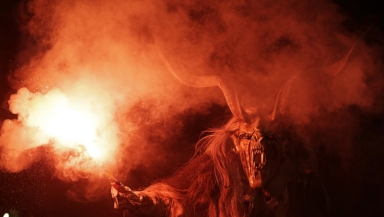
Do people possessed by the devil really vomit up pieces of iron or glass? That's what Vatican exorcist Fr Gabriele Amorth, who has died aged 91, believed. He also thought the Harry Potter books were evil because they encouraged children to believe in black magic, as was yoga because it was based on Hinduism, and he praised the 1973 film The Exorcist for giving a "substantially exact" representation of demonic possession.
Amorth believed sex abuse and homosexuality were demonically inspired and that Stalin and Hitler were demon-possessed, as was ISIS. He also thought there were satanist cells in the Vatican.
In a Facebook post last year quoted by the Catholic News Agency, he said: "ISIS is Satan. Things first happen in the spiritual realms, then they are made concrete on this earth." He continued: "There are only two spiritual realms: The Holy Spirit and the demonic spirit."
Well, I'll be frank: I struggle with that. I see a lot of truth in it, but I see a lot that's wrong with it, too. And my worry is that buying into that account of spiritual evil does more harm than good.
Is there a devil of some kind? Are there spiritual forces of wickedness? The scriptural witness seems to be clear. "For our struggle is not against flesh and blood, but against the rulers, against the authorities, against the powers of this dark world and against the spiritual forces of evil in the heavenly realms," says Paul (Ephesians 6:12). There are too many Scripture references to the demonic for them to be dismissed, liberal-style, as pre-modern attempts to account for psychological disturbance. That's not to say that we can't interpret some Bible stories in the light of what we know now. Some stories of demon possession (or "demonisation") fall into that category. But it would be naive to dismiss the demonic altogether. Evil is sometimes perceived as an overwhelming attack. We feel it, and we should listen to our feelings.
But there are some Christians who look for demons everywhere, and it's not surprising that they find them. And the danger with this is that it devalues the currency, and makes it harder to see real spiritual evil even when it's an urgent and deadly danger.
So witchcraft looks like what we've been trained by Hollywood to see – Harry Potter, for instance. Actually, I'd argue, Harry Potter is a harmless fantasy that has enriched the lives of millions of children (and adults, too). But it's tagged with "witchcraft", so it must be evil. Yoga originates in Hinduism, so it must be an alien and compromising religious practice. Well, you can do it like that and that would certainly be an issue for Christians, but you don't have to. Yoga is not inherently demonic. Stalin, Hitler and ISIS do terrible things, so they must be inspired by the devil if not actually possessed. But there's lots of evil in the world, and it doesn't take demons to make it happen.
The problem is that looking at the obvious and the spectacular allows far greater evils to hide in plain sight, and we run out of language to identify and resist it. If witchcraft is Harry Potter, the terrible suffering inflicted on albino people in some African countries, who are murdered and hacked to pieces for their body parts by witches there, goes uncondemned. If yoga is demonic just because it's Hindu and all other religions are bad, it's easier to avoid critiquing our own faith and confessing the sins of which it's sometimes guilty. If Hitler, Stalin and ISIS are demon-possessed, it's harder to see the seeds of evil out of which wickedness like theirs grows. It doesn't come from nowhere: it comes from fear, anger and stigmatising strangers – and that should sound very familiar.
And perhaps most of all, the problem with labelling everything evil as demonic is that it externalises wickedness. It lets us off the hook, because it's not really our fault. We – as individuals and as the human race – don't do wrong because we are weak, selfish, foolish or just plain bad. We do it because we're driven to it by a force greater than ourselves.
In fact, most of us don't need demons to make us do wrong; we're quite good enough at it anyway.
In the novel of The Exorcist, by seminary-educated William Peter Blatty, there's a preface with a list of genuine atrocities. There's no commentary, but there's an implied question: could human beings alone be responsible for these things? The answer, sadly, is "Yes, they can." And perhaps one of the most subtle ploys of the devil is to encourage us to blame it on him, instead of facing up to that.
Follow Mark Woods on Twitter @RevMarkWoods.













